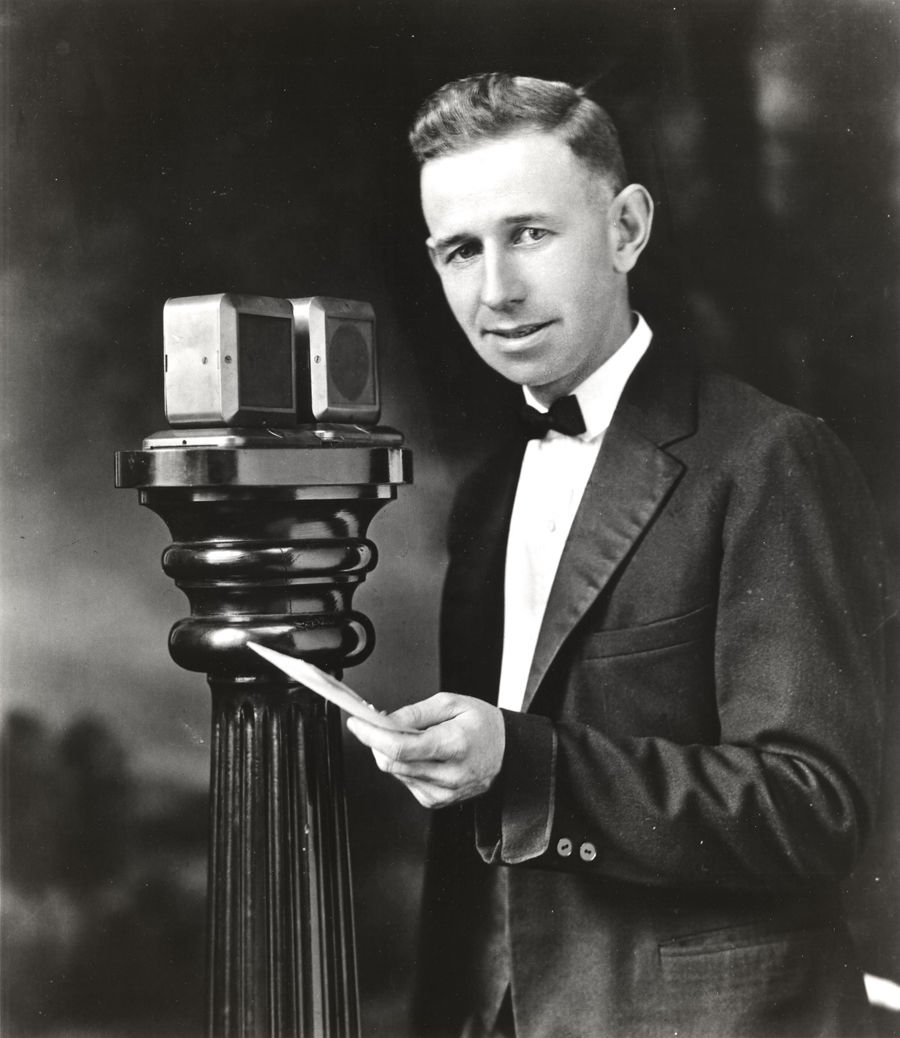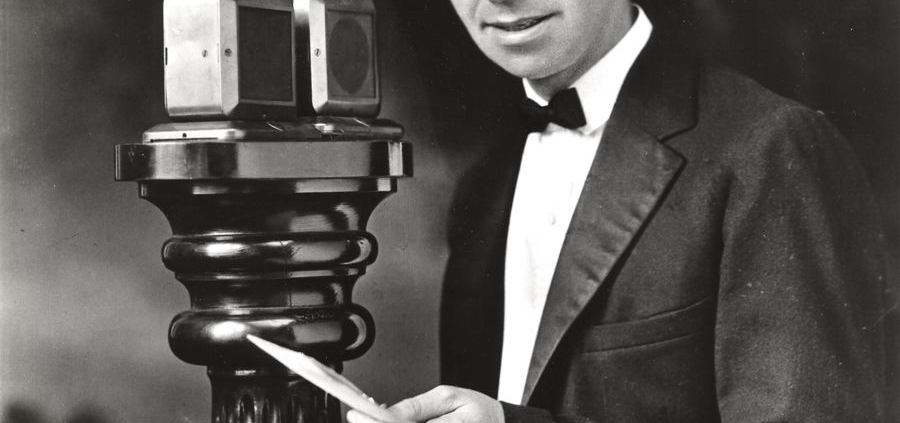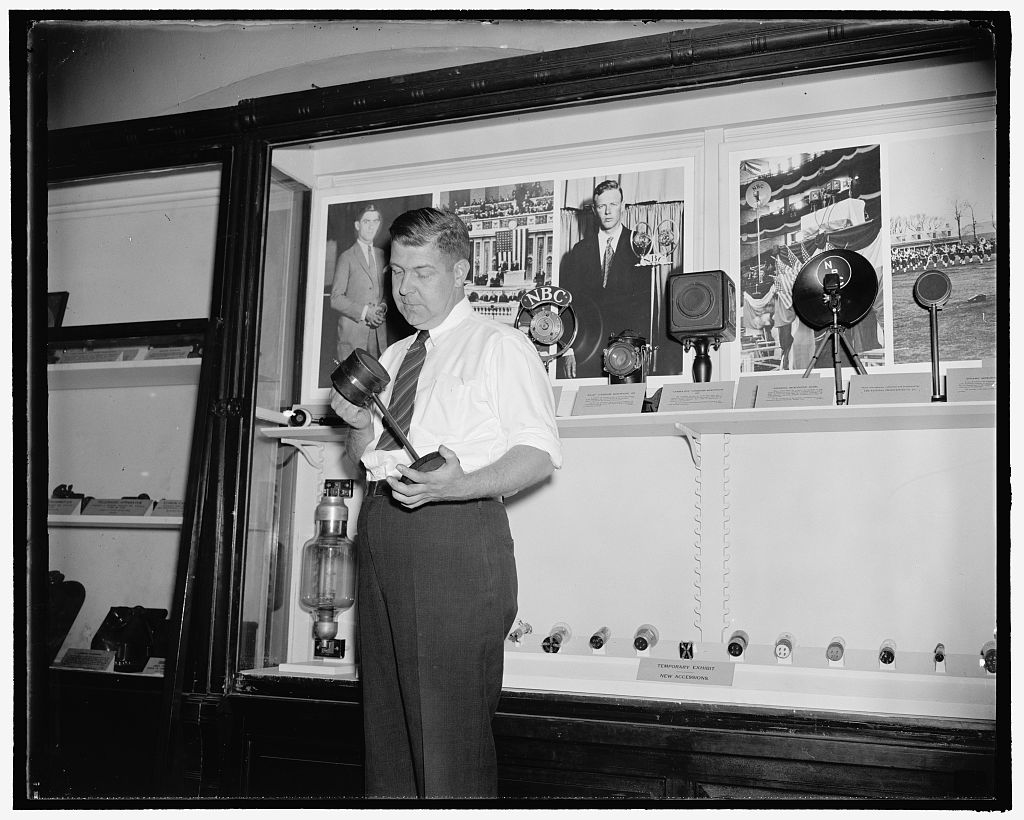August 5, 1921: KDKA’s Harold Arlin broadcasts first baseball game over commercial radio as Pirates rally to beat Phillies
 Jimmy Zinn spent 1921 as a swingman on the Pittsburgh Pirates’ pitching staff, contributing occasional starts but more often working from the bullpen. One of his most valuable performances came on August 5 at Pittsburgh’s Forbes Field. Tossing six innings of nearly spotless relief and adding two key hits, Zinn sparked the first-place Pirates to an 8-5 comeback win over the Philadelphia Phillies in the first baseball game broadcast over commercial radio.
Jimmy Zinn spent 1921 as a swingman on the Pittsburgh Pirates’ pitching staff, contributing occasional starts but more often working from the bullpen. One of his most valuable performances came on August 5 at Pittsburgh’s Forbes Field. Tossing six innings of nearly spotless relief and adding two key hits, Zinn sparked the first-place Pirates to an 8-5 comeback win over the Philadelphia Phillies in the first baseball game broadcast over commercial radio.
An Arkansas native whose wartime service in France partitioned stints with the Phillies and Philadelphia Athletics, Zinn joined the Pirates in September 1920.1 The 26-year-old right-hander, his side-arm delivery a takeaway from Grover Cleveland Alexander’s mentoring during a spring tryout with the Phillies, made two starts in April 1921 but moved to relief when Whitey Glazner seized a starting role. Five more starts followed in May and June, but Zinn returned to the relief corps after Johnny Morrison recovered from a spring case of influenza.2
Zinn was again in the bullpen as the Pirates went for a sweep of their early August series with Philadelphia.3 Five losses in six games in late July had dropped Pittsburgh into a first-place tie with the New York Giants, but the Pirates had won three in a row to restore a 3½-game lead in the National League standings. Hal Carlson, like Zinn an occasional starter and more frequent reliever for the Pirates, got the call against the Phillies, who were headed for their third consecutive last-place finish under their fifth manager since the end of the 1918 season. A succession of retired players from the Dead Ball Era – Pat Moran,4 Jack Coombs,5 Gavvy Cravath,6 and Bill Donovan – had cycled through the Phils dugout during that time, and now Kaiser Wilhelm, promoted from pitching coach on July 26 with Philadelphia submerged 37 games under .500, was at the helm.7
The Friday afternoon crowd at Forbes Field included NL President John Heydler, bound for New York after the Black Sox trial in Chicago. Local newspapers noted Heydler’s presence, but another attendee went unmentioned: a 25-year-old electrical engineer and employee of Pittsburgh’s Westinghouse Electric and Manufacturing Company named Harold W. Arlin.8 Westinghouse’s radio station, with call letters KDKA, was one of a handful of commercial stations to broadcast election results in November 1920, a watershed moment for the emerging medium.9
Now, after scattered amateur and commercial operators had sent baseball scores and reports over the wireless for nearly a decade, Westinghouse was attempting to transmit live play-by-play of a game. Arlin took a box seat behind home plate for what he regarded as a “one-off” endeavor, describing the action through a crudely assembled microphone.10
Anyone tuned in within KDKA’s 500-watt range heard the Phillies go ahead against Carlson in the first inning.11 Bevo Lebourveau walked with two outs and stole second. Curt Walker – part of Philadelphia’s return in the controversial trade that sent Irish Meusel to the Giants on July 2512 – singled in Lebourveau for a 1-0 advantage.
Philadelphia’s edge held until the second inning, when the Pirates capitalized on starter Jimmy Ring’s wildness. Possum Whitted and Clyde Barnhart drew walks to start the inning.13 Pittsburgh manager George Gibson ordered a sacrifice, and Cotton Tierney bunted the runners to second and third. With the infield in, Charlie Grimm bounced a single up the middle. Whitted and Barnhart came home, and the Pirates led, 2-1.
The Phillies answered their next time up, with a walk again leading the way. Jimmy Smith – a Pittsburgh native who had played in 36 games for the 1916 Pirates – opened the third by walking. Lebourveau’s swinging bunt single put two runners on, and Wilhelm directed Walker to bunt the runners up. After the sacrifice, Smith scored the tying run on a groundout by another former Pirate, Ed Konetchy.
Cy Williams followed. Already a two-time NL home-run champ with two more crowns in his future, the lefty-swinging Williams with 10 homers so far in 1921 trailed George “High Pockets” Kelly’s 18. Williams moved closer to Kelly’s pace by driving Carlson’s pitch into the right-field seats for a two-run homer and a 4-2 Philadelphia lead.
By the time the Phillies batted in the fourth, Zinn had replaced Carlson. Goldie Rapp walked with two outs, but catcher Tony Brottem, starting because Walter Schmidt had injured his finger in the previous day’s game, gunned down Rapp attempting to steal second. Zinn recorded another scoreless inning in the fifth, aided by Carson Bigbee’s running catch of Lebourveau’s drive to deep left.
In the meantime, Ring was rolling; Grimm’s groundout to start the fifth was the ninth Pirate retired in row. Brottem broke the streak a batter later with a single to right; he reached third “by a daring sprint and a long slide” on Zinn’s double down the left-field line.14 Bigbee hit a liner to right-center. Williams pulled it in with a running catch, but Brottem scored, cutting Pittsburgh’s deficit to 4-3.
Zinn induced Frank Parkinson’s double-play grounder to end the Philadelphia sixth, and the Pirates resumed their comeback in the bottom of the inning. Whitted popped a Texas Leaguer into right with one out and reached second for a double.15 Barnhart drove him in with an opposite-field triple down the right-field line. When Tierney rapped a single off Ring’s wrist, Barnhart scored, and the Pirates had a 5-4 advantage.
Grimm attempted to sustain Pittsburgh’s hit parade, but Ring’s pitch struck the lefty swinger around his right shoulder. “He tried to duck it, but as he whirled around the pill soaked him on the right shoulder blade and he went down like a log,” Edward F. Balinger reported in the Pittsburgh Post.16
Grimm writhed on the ground in pain for about 10 minutes before leaving the field. In accordance with baseball’s rules in 1921, the Pirates requested that Barnhart run for Grimm, which would permit the Pirate first baseman to remain in the game if his injury allowed.17 Wilhelm granted Pittsburgh’s request in what Balinger labeled “his good sportsmanship.”18 Ring retired Brottem and Zinn to end the inning, but the Pirates had gone back ahead.
Pittsburgh’s team physician judged Grimm’s injury serious enough for him to take the rest of the game off; Gibson sent Ray Rohwer to right and moved Whitted to first.19 The Pirates nursed their one-run lead into the top of the eighth, but Lebourveau led off with a single to right and moved into scoring position when the ball took a “funny hop” past Rohwer for an error.20 Walker dropped down a bunt. Whitted picked it up and threw wide of first, but Tierney made the grab for an out. Lebourveau advanced to third on the sacrifice; Konetchy’s single drove him in for Philadelphia’s first run since Zinn’s entrance, tying the game, 5-5.
Ring was still on the mound when Whitted led off the eighth with a line-drive single to right and took second on a wild pitch. Barnhart popped up for the first out, but Tierney walked, bringing up Rohwer.
The rookie from California atoned for his error. After fouling off “five or six” pitches, most of which landed in Forbes Field’s grandstand, Rohwer hit a bouncer into center for a single, just out of Smith’s reach at second.21 Whitted scored the go-ahead run; Tierney moved to third. Brottem’s single down the right-field line drove in Tierney for a 7-5 Pittsburgh lead. Zinn then singled to left for his second hit of the game, scoring Rohwer and pushing the margin to three runs.
It was all Zinn needed to close out the game. John Peters led off the Philadelphia ninth with a single, but pinch-hitter John Monroe fanned. Rapp and Smith followed with outs, and Zinn had completed an outstanding day of relief work: six innings pitched, one unearned run allowed.
With the win, the Pirates maintained their 3½-game lead over the Giants. Pittsburgh won 16 of 21 games between August 1 and August 22 to push its advantage to 7½, but a six-game losing streak in late August – including a five-game sweep by the Giants – kicked off a collapse that left the Pirates in second place, four games behind New York, in the final ledger.
Jimmy Zinn finished 1921 with a 3.68 ERA in 32 appearances. The “big boy with the good nature,” per Pittsburgh’s Gazette Times, began 1922 with the Pirates but requested his release after pitching in only five games through May.22 Zinn returned to the majors only once after Pittsburgh – as a Cleveland Indian in 1929 – but pitched in the minors until 1939 and played on championship teams in the American Association (the 1923 Kansas City Blues) and Pacific Coast League (the 1931 San Francisco Seals).
Arlin’s broadcast was indeed a “one-off” for Westinghouse Electric and the 1921 Pirates, but he returned to Forbes Field in October to broadcast a college football game between the University of Pittsburgh and West Virginia University, the first live football game broadcast over radio.23 That same month, KDKA and other stations broadcast World Series games between the Giants and New York Yankees, and baseball’s relationship with radio continued to grow.24
This ‘Tomato Can’ radio microphone was used by Pittsburgh radio station KDKA to broadcast the Harding-Cox presidential election returns on November 2, 1920, the first announced broadcast in the United States. In 1921, KDKA became the first station to broadcast live sporting events and, on August 5, the first to broadcast a major-league baseball game between the Pittsburgh Pirates and Philadelphia Phillies. Fred C. Reed of the Smithsonian Institution is pictured with the historic microphone in 1938. (LIBRARY OF CONGRESS, HARRIS & EWING COLLECTION)
Sources
In addition to the Sources cited in the Notes, the author consulted the Baseball-Reference.com and Retrosheet.org websites for pertinent material and the box scores noted below; game coverage in the Pittsburgh Gazette Times, Pittsburgh Post, Pittsburgh Press, and Philadelphia Inquirer newspapers; and several relevant SABR Baseball Biography Project biographies, especially Gregory H. Wolf’s biography of Johnny Morrison, and Steven V. Rice’s biographies of Irish Meusel and Jimmy Zinn. The author thanks SABR members Donna L. Halper and Bill Nowlin for their feedback on earlier drafts of this article and Kevin Larkin for fact-checking the article.
https://www.baseball-reference.com/boxes/PIT/PIT192108050.shtml
https://www.retrosheet.org/boxesetc/1921/B08050PIT1921.htm
Photo credits:
Harold Arlin: George Westinghouse Museum Collection, Detre Library & Archives Division, Senator John Heinz History Center Pittsburgh, PA
Tomato Can microphone: Library of Congress, Harris & Ewing Collection
Notes
1 “New Pirate Find Off for Chicago to Join Buccos,” Pittsburgh Post, September 4, 1920: 8.
2 Charles J. Doyle, “Bucs Bat Vaughn Hard and Beat Cubs, 10-3: Pirate Lead Increased to Four Games,” Gazette Times, June 28, 1921: 9.
3 The Pirates and Phillies were scheduled for a four-game series, but rain on Monday, August 2, postponed the opener until Philadelphia’s September visit to Forbes Field. Edward F. Balinger, “Pirates, Idle, Gain on League Race as Cardinals Beat Giants: Wet Grounds Cause Postponement of Opener with Phils,” Pittsburgh Post, August 3, 1921: 8. Pittsburgh rallied from an early five-run deficit for a 9-5 win on August 3; a day later Earl Hamilton blanked the Phils on five hits in a 5-0 Pirates win. Charles J. Doyle, “Pirates Win Slugfest Over Phillies, 9-5: Cooper Tightens After Quakers Open with Rush,” Gazette Times, August 4, 1921: 9; Charles J. Doyle, “Pirates Blank Phils in Second Game, 5-0; Hamilton Allows Five Bingles and Bats in Two Runs,” Gazette Times, August 5, 1921: 9.
4 “Plenty of Action at National League’s Pow-Wow: Jack Coombs to Manage Phillies, Moran Released,” Philadelphia Inquirer, December 11, 1918: 16.
5 “John Coombs Retires as Manager and Cravath Is New Leader of Phillies: Former Great Pitcher Discouraged Over Miserable Recent Showing of His Team,” Philadelphia Inquirer, July 9, 1919: 13.
6 “Bill Donovan Made Manager of Phils: Former Detroit Pitching Star to Lead Quakers in 1921 Championship Dash,” Philadelphia Inquirer, December 11, 1920: 20.
7 “Donovan Out as Manager of Phillies, Is Story From West: Reported That ‘Kaiser’ Wilhelm Has Been Put in Charge of Team,” Philadelphia Inquirer, July 30, 1921: 8.
8 Burt A. Folkhart, “Nation’s First Baseball Broadcaster: Radio Pioneer Harold Arlin Dies at 90,” Los Angeles Times, March 18, 1986: 21.
9 Folkhart.
10 Paul Dickson, “How Radio Gave Baseball Its Voice,” available at https://sabrmedia.org/2016/04/26/how-radio-gave-baseball-its-voice-paul-dickson/.
11 D.G. Little, “KDKA: The Radio Broadcasting Station of the Westinghouse Electric and Manufacturing Company at East Pittsburgh, Pennsylvania,” Proc. IRE, vol. 12, 255-276, June 1924.
12 “Time Landis Called a Halt to the Activities of J.J. McGraw,” Brooklyn Daily Eagle, July 27, 1921: 2; James C. Isaminger, “Philadelphia Fans Angered at Trade of ‘Irish’ Meusel: Many Declare Money was Real Reason for Letting Heavy Hitter Go,” Washington Times, July 27, 1921: 12.
13 Ring’s 88 walks allowed in 1921 were third highest among National League pitchers. He led the NL in walks allowed in each of the next four seasons.
14 Edward F. Balinger, “Pirates Flog Phils 8-5 and Streak Covers Four Straight Wins: Ray Rohwer’s Rap Smashes Deadlock and Brings Bacon,” Pittsburgh Post, August 6, 1921: 8.
15 “Details of the Game,” Pittsburgh Post, August 6, 1921: 8.
16 Balinger, “Pirates Flog Phils 8-5 and Streak Covers Four Straight Wins.”
17 Use of courtesy runners under these circumstances remained an informal part of National and American League baseball until May 1950, when Commissioner A.B. “Happy” Chandler announced a rule interpretation forbidding the practice. Vince Johnson, “A Courtesy Runner for Lou Boudreau,” Pittsburgh Post-Gazette, June 23, 1949: 15. “Chandler Announces Interpretations of Baseball’s Revised Playing Code,” Hartford Courant, May 10, 1950: 16.
18 Balinger, “Pirates Flog Phils 8-5 and Streak Covers Four Straight Wins.”
19 Grimm returned to Pittsburgh’s lineup a day later. As Balinger noted in the Pittsburgh Post, “[a]n examination at the hospital showed that no bones had been broken and although he is nursing a painful bruise that extends deep into the muscles, Grimm gamely insisted upon getting back to his place on the initial bag.” Edward F. Balinger, “Pirates Lose to Dodgers, 3-2, But Lead Is Unchanged: Sacrificial Swat by Peter Kilduff Defeats Corsairs,” Pittsburgh Post, August 7, 1921: 3,2.
20 Balinger, “Pirates Flog Phils 8-5 and Streak Covers Four Straight Wins.”
21 Balinger.
22 Charles J. Doyle, “Buccos Sell Zinn; Gain as Giants Lose: Former Texas Leaguer Goes to Kansas City,” Gazette Times, June 3, 1922: 9.
23 Folkhart, “Nation’s First Baseball Broadcaster: Radio Pioneer Harold Arlin Dies at 90.”
24 “Brothers, 5 to 7 Years Old, Get Score by Wireless,” Pittsburgh Sunday Post, October 9, 1921: 2,1.
Additional Stats
Pittsburgh Pirates 8
Philadelphia Phillies 5
Forbes Field
Pittsburgh, PA
Box Score + PBP:
Corrections? Additions?
If you can help us improve this game story, contact us.



